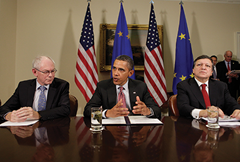EU-USA trade talks open
 A trans-Atlantic free trade agreement would cut costs for Northern Ireland’s exporters but may also open up local markets to more competition.
A trans-Atlantic free trade agreement would cut costs for Northern Ireland’s exporters but may also open up local markets to more competition.
Barack Obama has announced that the US Government will launch talks on a free trade agreement between the European Union and the USA. Obama said that “trade that is fair and free across the Atlantic supports millions of good-paying American jobs.”
The deal would officially be known as the Trans-Atlantic Trade and Investment Partnership and would remove tariffs and import quotas on good and services. Its extent is not yet known as it will be decided in negotiations.
Trade will feature highly at the Lough Erne G8 summit in June. EU-USA trade is currently worth around $450 billion per year and supports around 13 million jobs.
A comprehensive deal would cover 38.3 per cent of the world’s economy. The International Monetary Fund estimates that the EU has 19.4 per cent of global GDP, followed closely by the USA on 18.9 per cent. China’s estimated share is 15 per cent.
Free trade would reduce the costs of exporting to the USA from Northern Ireland. Businesses and the Executive would need to maximise their US links as all European regions are likely to ‘look west’ once a deal is signed.
International trade is one of the ‘exclusive competences’ transferred by member states to the EU. The union is a member of the World Trade Organisation in its own right and is frequently involved in trade disputes with the USA. Both sides have been keen to protect their manufacturing and agri-food industries from competition, and there are significant differences in health and safety standards.
Support for such a deal has increased in recent years due to the impact of the recession and the growth of the BRIC economies. A working group was set up at the November 2011 EU-US summit. European Commission President José Manuel Barroso regards a deal as a “game-changer” but no agreement is expected before 2015 due to the level of detail involved.
The proposal was raised by the Ulster Conservatives and Unionists in their 2009 European election manifesto. “The developed world, just as much as the developing world, would benefit from greater free trade,” it stated. “That is why Conservative MEPs will press for the realisation of a transatlantic common market-place by 2015.”
Sinn Féin, though, has said that free trade tends to benefit larger businesses with international links, at the expense of SMEs. “The European Commission has for many years been pursuing an agenda of aggressively promoting free trade over fair trade,” Vice-President Mary Lou McDonald said in 2009, claiming that the Commission’s approach to trade would be “devastating for Irish and European family farms and rural communities.”
The EU already has free trade agreements with South Korea, Mexico, Chile and South Africa. Negotiations will be led by European Trade Commissioner Karel de Gucht (from Belgium) and US Trade Representative Ron Kirk.





